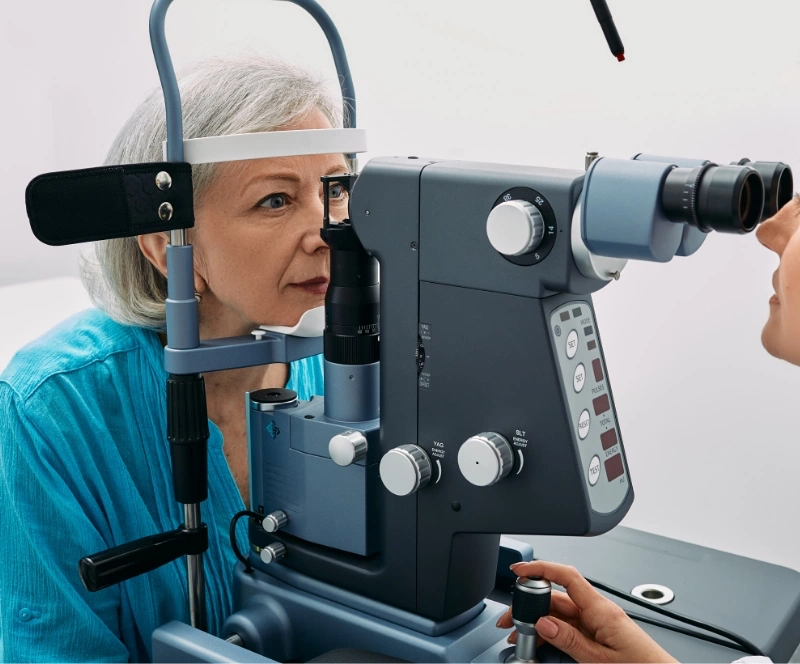Cataract Surgery
Is cloudy vision getting in the way of work or doing what you love? Cataracts may be to blame. If you’re looking for cataract treatment in the Denver area, Montgomery Eye Care in Northglenn, CO, can help.
Is cloudy vision getting in the way of work or doing what you love? Cataracts may be to blame. If you’re looking for cataract treatment in the Denver area, Montgomery Eye Care in Northglenn, CO, can help.

Your eye has a clear lens that sits behind the colored part (the iris). The lens helps focus light as it passes through the eye. Cataracts happen when protein buildup causes the lens to become cloudy. Once cataracts develop, light can’t pass through the lens to the retina at the back of the eye and vision becomes blurry.
Cataracts are a normal part of aging. In fact, more than half of people in the United States have cataracts by the age of 80, although they can start developing as
Trusted Source
Cataract Surgery
American Academy of Ophthalmology
Go to Source
young as 40
. While cataracts can occasionally be caused by eye injuries or other factors including medical problems and medications, they are usually age-related.
When cataracts first start to interfere with your vision, you may be able to adjust your glasses or contacts prescription to help you see better. But as cataracts get worse, you will eventually need cataract surgery to restore clear vision.
The only way to get rid of cataracts is to have surgery to remove them. The good news is that cataract surgery is one of the most commonly performed surgeries in the world and it is considered an extremely
Trusted Source
Cataract Surgery
Refractive Surgery Council
Go to Source
safe and effective procedure
.
In cataract surgery, your eye’s clouded lens is replaced with a new lens called an intraocular lens or IOL.
The first step to getting your vision back is to schedule a consultation with Dr. Montgomery. This no-pressure appointment is your opportunity to ask any questions and learn more about your surgery options. Dr. Montgomery will examine your eyes to make sure that cataract surgery is right for you, then he’ll explain everything and review your treatment plan. Finally, he’ll give you pre-surgery instructions that may include using eye drops.
Cataract surgery is an outpatient procedure. The actual surgery takes less than 20 minutes, but you can expect to be at the clinic for a few hours for check-in and recovery. Cataract surgery is typically performed on one eye at a time; if you need cataract surgery in both eyes, the procedures will take place on different days, usually 1-3 weeks apart. Your eye will be numbed with anesthetic eye drops and you may get medication to help you relax.
You will need a friend or family member to drive you home from surgery. A protective shield will be placed over your eye and you should expect to rest for the remainder of the day. It is normal to feel some mild irritation in the eye, but that should go away quickly. Dr. Montgomery will give you detailed post-op instructions and schedule a follow-up appointment to make sure your eye is healing properly. Full healing takes several weeks, but most patients resume work and regular activities within 1 to 3 days. You will need to avoid strenuous activity and dusty environments for at least one week.
When you have cataract surgery, there are several types of IOLs to choose from. Cataract surgery can actually be an opportunity to vastly improve your vision, since advanced IOLs can do more than just treat cataracts—they can also correct nearsightedness, farsightedness, presbyopia, and astigmatism. Some of the advanced IOL options we offer include the PanOptix® Trifocal IOL, which can correct vision at multiple distances, and the Light Adjustable Lens™ from RxSight®, which is the only IOL that can be prescription-adjusted after surgery.
Dr. Montgomery knows that you have choices when it comes to your eye care, and he is grateful that you would consider trusting him with your vision. He is dedicated to serving the greater Denver community, where he has practiced since 1996. Dr. Montgomery has performed more than 30,000 procedures and he is board-certified. He invests in the latest technology, such as the Optiwave Refractive Analysis (ORA) SYSTEM®, to ensure that patients get the most accurate vision correction. He works to keep eye care affordable and creates treatment plans that are tailored to each patient’s needs.

I was very apprehensive about having cataract surgery . Your vision is the most important thing in your life. My eye doctor recommended the professionals at Montgomery eye care. I couldn't be happier with the outcome. All of the people I interacted with were very helpful and professional. With state of the art equipment and eye surgeons trained in the latest. Developments and techniques. Thank you Montgomery eye care!
Anonymous

Thanks Dr. Montgomery for my cataract surgery, I see great!
Ruby C.

I have always received great care from Montgomery Eye Care and an excellent result from the Cataract operation I had a few years ago. If you are looking to get the best eye health then this practice should be high on your list.
Anonymous

I had cataract surgery on both eyes 3 years ago. Dr. Montgomery made my left eye nearsighted, and right eye farsighted. "I have the best of both worlds!" I can hold a book 5" or 24" from my face and read. Doctor Montgomery and his staff have "always" been extremely professional. I highly recommend this group of pros to anyone looking for eye care.
RubyC.


No, cataracts are a natural part of the aging process and there is no way to prevent them. It is important to take care of your vision with regular eye exams so your eye doctor can diagnose any age-related changes early enough to treat them properly.


Cataract surgery is one of the safest and most commonly performed surgeries, but any surgical procedure carries some risk. Possible risks of cataract surgery include infection, inflammation, swelling, bleeding, and
Trusted Source
Cataract Surgery
Mayo Clinic
Go to Source
retinal detachment
. You can minimize your risk by choosing an experienced surgeon and following all pre and post surgical instructions.


Patients often develop cataracts in both eyes, although they can progress at different rates and need treatment at different times and some patients will have a cataract in just one eye. In either case, we typically perform surgery for each eye in separate procedures on different days.


Cataract surgery is typically a quick and routine procedure. General anesthesia (or being “put to sleep”) is not necessary and not recommended because it would introduce greater risk of complications from anesthesia. Your eye will be numbed so you are comfortable and you will also be offered a mild IV sedative to help you relax.


LASIK is a great procedure to correct vision, but it does not treat cataracts. LASIK works by reshaping the cornea, but cataracts are a problem with the lens inside the eye.


Not exactly, but there is a condition called posterior capsule opacification, or PCO, that can develop after cataract surgery. PCO is sometimes called “secondary cataracts” because they cause symptoms similar to cataracts, but this condition can be fixed without cataract surgery. If you develop secondary cataracts, Dr. Montgomery can use a YAG laser to treat them in his office. Dr. Montgomery can use a YAG laser to treat them in his office.
Give us a call at: (303) 252-9981 or fill out the form below to request a consultation!
1 National Eye Institute. Cataracts. Available: https://www.nei.nih.gov/learn-about-eye-health/eye-conditions-and-diseases/cataracts Accessed August 5, 2022
2 Refractive Surgery Council. Cataract Surgery. Available: https://americanrefractivesurgerycouncil.org/cataract-surgery/ Accessed August 5, 2022.
3 Mayo Clinic. Cataract Surgery. Available: https://www.mayoclinic.org/tests-procedures/cataract-surgery/about/pac-20384765 Accessed August 5, 2022.
The doctors at Montgomery Eye Care have authored or reviewed and approved this content. | Page Updated:



